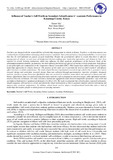| dc.description.abstract | Teachers are charged with the responsibilities of leadership management in schools in Kenya. Teachers, as decision-makers, are continually faced with problems managing school resources and funds. Since principals have a lot of responsibilities, it is necessary that they be well informed on aspects of good leadership. Despite the government's efforts to ensure that there is effective management of schools, several cases of uninformed decision-making, poor leadership approaches, and dishonesty have been reported in several learning institutions, which may influence the final academic performance of the learners. Some of the substandard academic students’ performance has been linked to the lack of self-efficacy of teachers in their profession. Self-efficacy is one of the eight core competencies in the Competency-Based Curriculum (CBC). Other studies have addressed the issue of teacher leadership approaches in schools, however. The purpose of this study was to ascertain the level to which teachers' self-efficacy affects learners' academic performance. The study adapted the non-experimental research design, which is the ex-post-facto survey research design and correlation research design. Data was collected through questionnaires, interview schedules, document analysis, and focus group discussion. Qualitative data was received in verbative, transcribed, and reported in themes and sub-themes. Quantitative data was analysed using descriptive statistics such as frequencies and percentages, while inferential statistics involved Pearson correlation. The study revealed a statistically significant result between components of teachers’ self-worth and secondary school learners’ academic performance (r=.68, p<.05). The study recommends that school leaders, especially principals, should cooperate with teachers to create and reform the school environment so that it can foster students' interest in learning and improve their academic performance. In addition, school heads need to adopt a transformational leadership style—a kind of leadership that inspires people to attain greater or amazing outcomes. | en_US |

